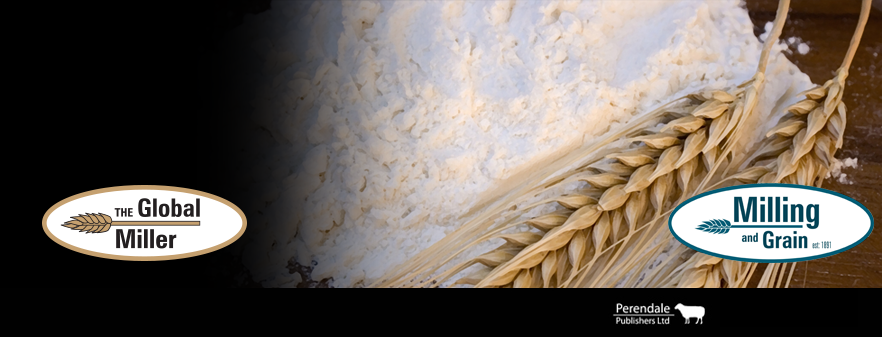Dr Ali El-Sayed Ali Al-Moselhi is the Egyptian Minister of Supply and Internal Trade.
He previously held the position of Egyptian minister of Social Solidarity in the cabinet of Dr Ahmed Nazif and a member of the Parliament, the People’s Assembly, for the constituency Abu Kabeer, Ash Sharqiyah Governorate.
The International Association of Operative Millers (IAOM) Mideast and Africa Chapter held its annual conference and exhibition in Dubai from October 22-25, 2017 and invited Egypt’s Minister of Supply and Internal Trade, His Excellency Dr Ali El-Sayed Ali Moselhi, to participate in the conference’s closing Panel Discussion on ‘Wheat imports – MEA Regional Outlook’.
Dr El-Sayed Ali Moselhi spoke to Milling and Grain about Egypt’s experience of providing subsidized flour, and other foodstuffs, to its growing population.
Egypt has a population of 98 million and provides subsidised food to 80 million people.
He is opposed to food subsidies on an economic basis, but recognises their role in helping to sustain many of his countrymen’s nutrition and health.
Can you outline for our readers Egypt’s wheat demand for the current year?
Concerning the wheat trade in Egypt, we produce about eight million tonnes while our consumption is between 19 - 20 million tonnes.
This means that we need to import between 11-12 million tonnes annually, which makes us the number one importer of wheat in the world.
There is much availability of wheat right across the whole world. Last year left us with high stocks and while production this year is not as high as last year the net residual in carryover is expected to be higher at the end of 2017-18 than it was for 2016/17.
This gives all of us, and Egypt in particular a sense of stability in the market. We have Russia, countries around the Black Sea plus Romania and France with supplies. The tonnages that we acquired earlier this year have given us stability and we may exceed them once we have reasonable prices. So the flow of wheat into Egypt is continuing normally and as everyone knows we are always working to have reserves of about three months.
The competition for suppliers now is about balancing quality and price.
Is there likely to be a significant purchase by the end of the year?
Our purchasing is regular at about one million tonnes per month. Sometimes that goes up and sometimes it comes down. But we have a limited capacity in our ports concerning the number of ships that can arrive at any moment and we have finite grain storage capacities.
Egypt has a subsidised bread policy. With all the experience that it has accumulated over the years, you might have some good advice for other countries that face food shortages and yet don’t want to disrupt their commercial industries such as the milling and baking sectors. Do you think subsidy has been a good policy for the people of Egypt?
No. It is not recommended that you go into subsidies except if you are obliged to make the life of people easier, but to go into subsidy especially for a very basic commodity such as bread it would be my recommendation not to do so.
We have to control it quite closely, to monitor it, to minimise losses and minimise the misuse of the bread flour and bread produced.
You also have to define who really deserves this type of full subsidy because you are giving them something of value for next-to-nothing.
Consequently, you will have ranges of need and this means offering subsidised food products at different prices to different entitlement groups at different quantities and so on.
Egypt is not small and because some 80 million Egyptian citizens are entitled to use this subsidy, it means that every day we have to distribute over 250 million loaves of subsidised bread.
The cost is very high so you have to make it economically viable whilst maintaining social and political stability. To succeed you have to have a programme that is very transparent and clear, and manage the development at different social and economic levels to determine who needs what.
In any case, subsidised bread does not decrease the total amount of wheat that we consume. But, not having subsidised bread would relieve the toughness on the government budget, because this program has a very high priority and no one can touch that.
Is Egypt subsidising meat as well as wheat?
Currently we do not subsidise meat, although in the past we had tried to offer subsidized meats but with the increases of prices of meat we started to remove ourselves completely from this activity in March this year.
Today, we ‘buy in bulk’ for sale at commercially acceptable prices.
For example, we have significant contracts with Sudan, Brazil, Argentina and other suppliers, which allows us to sell at above cost.
We are trying to make it available at affordable prices without using subsidies. As a result this is indirectly placing a cap on competitors’ prices without dictating prices and without using subsidies, which in our view is a good thing.
There must be a lot more to subsidising foodstuffs than just finance?
Yes, that’s right. One of the big issues associated with subsidising foodstuffs is the need for a government to provide channels for the distribution of food in order to make these basic food commodities available at a normal and fair price.
Working on these basics, which includes logistics such as storage and processing facilities across the whole supply chain, is the real start of a subsiding system.
We are planning to develop a logistical infrastructure in order to facilitate all these things right from feed production through to mill processing for example.



No comments:
Post a Comment